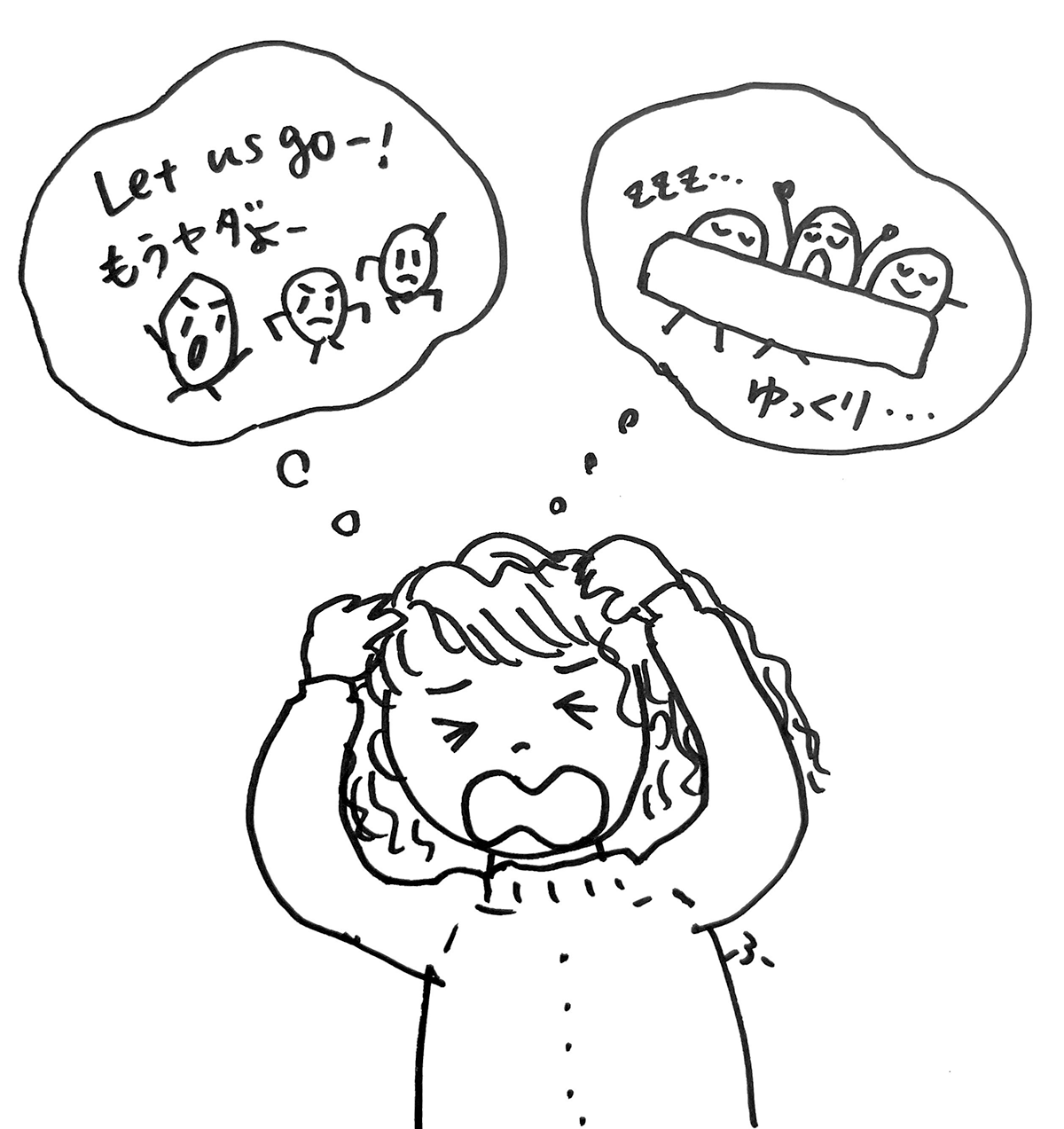Read in Japanese
Note: In case descriptions, personally identifiable information is changed and written with a client’s consent. Furthermore, maintaining the characteristics and essence of memory reprocessing therapy, multiple clients’ experiences are combined in the narrative.
A former client of mine, a mother troubled by her teenage child’s violence, came to see me. Let’s call her Ms. S. She is in her early-40s, works in a legal profession, and co-parents her two teenagers with her ex-spouse. At work, Ms. S is a dynamic team leader, relied upon by her subordinates. However, when her daughter shouted obscenities or threatened to break curfew, her heart would race, and she would feel paralyzed by fear, unable to take action. This resulted in a situation where her daughter seemingly had free rein. Ms. S found herself overwhelmed by tears and unable to respond or even advise her daughter for over a year.
Ms. S had multiple past traumas. After six months of 1.5 to 2-hour sessions, she opted for intensive therapy. We began with EMDR (Eye Movement Desensitization and Reprocessing), Progressive Counting, and Flash techniques, starting from her earliest traumatic memories. The first target during the week-long intensive session turned out not to be the adolescent experiences Ms. S initially thought of, but mostly her childhood events: harsh words from her parents, experiences of exclusion and bullying during elementary school. After three days of addressing childhood traumas involving her parents, Ms. S reported her progress. “Even when my daughter yells at me now, I somehow remain calm.”
During memory reprocessing, emotions and thoughts towards perpetrators often surface. In the session addressing an incident of sexual harassment in middle school, Ms. S realized that while the fear toward the groper was significant, what haunted her more was her parents’ lack of response to the incident. Understanding that the adults closest to her neither took action nor knew how to, gave her insights into the despair and helplessness at the core of her CPTSD (Complex Post-Traumatic Stress Disorder). Reflecting on how she had promptly supported her daughter during a school incident by listening to her and contacting the teacher, Ms. S recognized her own strength and capability as a parent. Additionally, considering her parents’ backgrounds, professions, the historical context, and political influences, Ms. S realized their limitations in finding support. Acknowledging this, she felt a sense of relief.
Even before reprocessing half of the events she wanted to address in trauma therapy, Ms. S reported feeling a “sufficient sense of calm.”
Ms. S (and I) initially believed that the fear and helplessness she felt around her daughter were rooted in her past romantic relationships. However, the intensive therapy revealed that the influence began from much earlier events. When the trauma memory of her childhood became neutralized, her view and interpretation of the events that occured afterward changed for a more comprehensive one.
Certain situations or people can cause emotional discomfort or even pain. During consultations for panic attack or anxiety disorders, it’s sometimes revealed that this emotional instability surfaces under specific relationships or themes. Some clients find relief with this realization, while others take a step further into memory reprocessing therapy.
Everyone has experienced feelings of helplessness once or twice. Usually, we realize that “it’s not true”, revealing our perfectionism, or that worries coming from past memories don’t have to be so powerful. But when this helplessness feels genuine and overwhelming, it may be a sign that trauma memories which have been trapped in the unconscious, are reacting to similar situations in the present, screaming “Let me out!” or “Process me, already!”.
急にちっぽけで無力な自分になってしまう
注:このブログの症例は、クライエントさんの承諾を得た上で、個人識別可能な情報を変えて書いています。さらに、トラウマセラピーの特質、症例のエッセンスを失わない範囲内で、複数のクライエントさんの経験談を混ぜて書いてあります。
かつてのクライエントさんに、ティーンのお子さんの暴力に悩んでおられるお母さんがいらっしゃいました。仮にエスさんとお呼びしましょう。エスさんは40代半ばで、法律関連のお仕事をしておられ、二人のティーンエイジャーを共同親権の元に育てておられました。職場ではチームリーダーとしてバリバリと仕事をこなし、部下に頼られるエスさんですが、娘さんが大声で悪態をついたり、門限を破りそうになると、心臓がどきどきしだし、『何もできなくなる。』『怖い』気持ちに苛まれ、『娘のやり放題』になってしまっている状況でした。『勝手に涙が溢れ出て』、自分の子供なのに、諭すどころか何か言い返したりもできずにいるような状態が1年以上続いていました。
エスさんには過去にいくつかのトラウマがあり、半年ほど1.5〜2時間のセッションを重ねた後、インテンシブを希望され、一番古い出来事からEMDRとプログレッシブカウンティング、フラッシュを使いながら治療を重ねていきました。1週間のインテンシブで最初にターゲットとなったのは、エスさんが最初のコンサルテーションの時に考えていた青年期のものではなく、ほとんどが彼女の子供時代の出来事。両親からの心無い言葉や、小学校時代の仲間はずれをされた経験。幼少期の、両親に関わるトラウマメモリーについて働きかけた3日後、「娘が怒鳴ってきても、なぜか平静でいられるようになりました。」と報告されました。
メモリー再処理の過程で、加害者にあたる人たちへの感情や考えが湧き上がることもあります。中学校時代の痴漢被害についてのセッションで、痴漢に対する恐怖心はもちろんですが、何よりも、その被害についてご両親が『何もしようとしなかった。』事がエスさんを長年苦しめてきてのだとわかりました。1番近くにいる大人が行動を起こさなかった、または起こす術を知らなかった事が、エスさんのCPTSD(Complex post-traumatic stress disorder)の根底にある絶望感や無力感に現実味を帯わせているのだと気づいた後、エスさんは、娘さんがかつて学校でトラブルに巻き込まれそうになった時、いち早く娘さんに気持ちを聞いて歩み寄ったり、担任に連絡を取ることができた自分を思い出し、自分の強さ、親としての適性に気づくことができました。また、両親の生い立ち、職業、その頃の時代背景や政治的影響を振り返った時、公や周りにサポートを見出すことの少なかった両親、またその理由に気づき、同じ親として、総合的にみて、彼らはできることとできないことがあったのだと受け入れ、楽になっている自分に気付きました。
エスさんがトラウマセラピーを受けたかった出来事の半分も再処理していない時点で、エスさんは「十分に平静な心」を感じることができるようになりました。
エスさんは(そして私も)、娘さんの周りで感じる恐怖感や無力感は、過去のパートナーとの関係にあると思っていたのですが、インテンシブの結果、もっと昔の出来事から影響は始まっていたのだとわかりました。そして、幼い時のメモリーがニュートラルなものになった時、その後に起こる出来事に対する彼女の見方と解釈は、より包括的なものへと変化しました。
特定の状況や人の近くにいると、感情的に不安定になってしまうということがあります。また、パニック障害や不安障害の相談でお話を聞いているうちに、その「感情的不安定」はある種の人間関係やテーマの元に現れるとわかってくることがあります。クライエントさんによっては、その気づきで気持ちが楽になることもあれば、一歩踏み込んでメモリー再処理に進む場合もあります。
誰でも一度や二度自分が無力に感じてしまった経験はあるでしょう。大抵の場合、「いや、そんな事ない!」と気づいたり、友人に「そんな事ないよ。」と言ってもらったりして、完璧主義や過去の思い出からくる一時的な思いこみが、取り越し苦労だったと気づくものです。でも、その無力さが本当に思えたり、身体ごとそう感じてしまう場合、無意識の中に閉じ込められたままのトラウマメモリーが何らかのよく似た状況に反応して、「ここから出してよ!」「早く処理してよ!」と騒いでいるのかもしれません。

